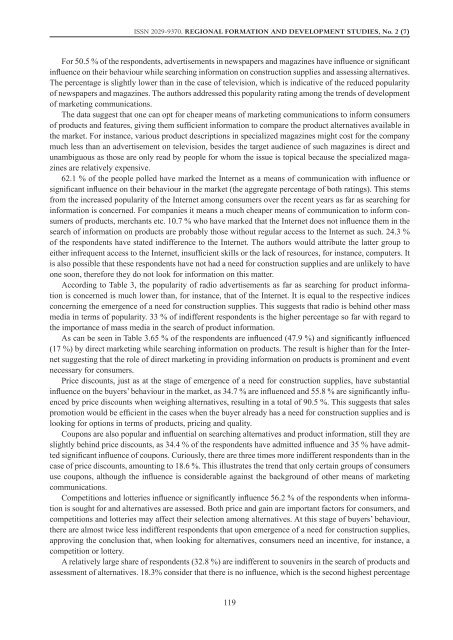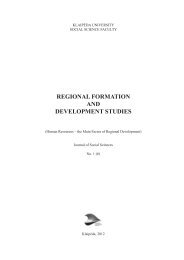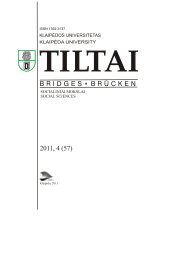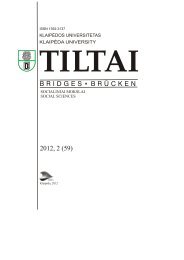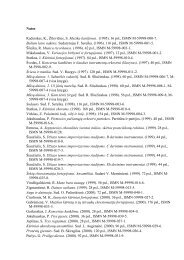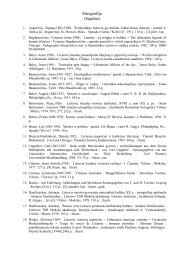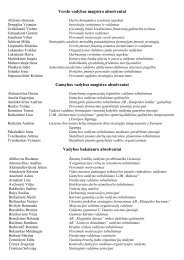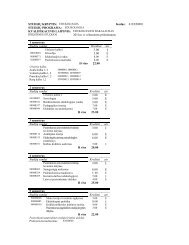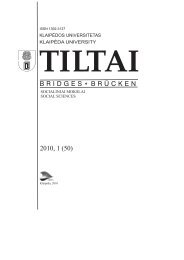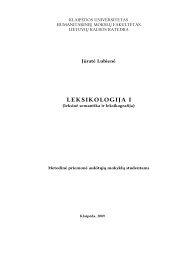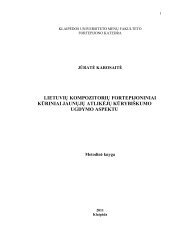regional formation and development studies - KlaipÄdos universitetas
regional formation and development studies - KlaipÄdos universitetas
regional formation and development studies - KlaipÄdos universitetas
Create successful ePaper yourself
Turn your PDF publications into a flip-book with our unique Google optimized e-Paper software.
ISSN 2029-9370. Regional Formation <strong>and</strong> Development Studies, No. 2 (7)<br />
For 50.5 % of the respondents, advertisements in newspapers <strong>and</strong> magazines have influence or significant<br />
influence on their behaviour while searching in<strong>formation</strong> on construction supplies <strong>and</strong> assessing alternatives.<br />
The percentage is slightly lower than in the case of television, which is indicative of the reduced popularity<br />
of newspapers <strong>and</strong> magazines. The authors addressed this popularity rating among the trends of <strong>development</strong><br />
of marketing communications.<br />
The data suggest that one can opt for cheaper means of marketing communications to inform consumers<br />
of products <strong>and</strong> features, giving them sufficient in<strong>formation</strong> to compare the product alternatives available in<br />
the market. For instance, various product descriptions in specialized magazines might cost for the company<br />
much less than an advertisement on television, besides the target audience of such magazines is direct <strong>and</strong><br />
unambiguous as those are only read by people for whom the issue is topical because the specialized magazines<br />
are relatively expensive.<br />
62.1 % of the people polled have marked the Internet as a means of communication with influence or<br />
significant influence on their behaviour in the market (the aggregate percentage of both ratings). This stems<br />
from the increased popularity of the Internet among consumers over the recent years as far as searching for<br />
in<strong>formation</strong> is concerned. For companies it means a much cheaper means of communication to inform consumers<br />
of products, merchants etc. 10.7 % who have marked that the Internet does not influence them in the<br />
search of in<strong>formation</strong> on products are probably those without regular access to the Internet as such. 24.3 %<br />
of the respondents have stated indifference to the Internet. The authors would attribute the latter group to<br />
either infrequent access to the Internet, insufficient skills or the lack of resources, for instance, computers. It<br />
is also possible that these respondents have not had a need for construction supplies <strong>and</strong> are unlikely to have<br />
one soon, therefore they do not look for in<strong>formation</strong> on this matter.<br />
According to Table 3, the popularity of radio advertisements as far as searching for product in<strong>formation</strong><br />
is concerned is much lower than, for instance, that of the Internet. It is equal to the respective indices<br />
concerning the emergence of a need for construction supplies. This suggests that radio is behind other mass<br />
media in terms of popularity. 33 % of indifferent respondents is the higher percentage so far with regard to<br />
the importance of mass media in the search of product in<strong>formation</strong>.<br />
As can be seen in Table 3.65 % of the respondents are influenced (47.9 %) <strong>and</strong> significantly influenced<br />
(17 %) by direct marketing while searching in<strong>formation</strong> on products. The result is higher than for the Internet<br />
suggesting that the role of direct marketing in providing in<strong>formation</strong> on products is prominent <strong>and</strong> event<br />
necessary for consumers.<br />
Price discounts, just as at the stage of emergence of a need for construction supplies, have substantial<br />
influence on the buyers’ behaviour in the market, as 34.7 % are influenced <strong>and</strong> 55.8 % are significantly influenced<br />
by price discounts when weighing alternatives, resulting in a total of 90.5 %. This suggests that sales<br />
promotion would be efficient in the cases when the buyer already has a need for construction supplies <strong>and</strong> is<br />
looking for options in terms of products, pricing <strong>and</strong> quality.<br />
Coupons are also popular <strong>and</strong> influential on searching alternatives <strong>and</strong> product in<strong>formation</strong>, still they are<br />
slightly behind price discounts, as 34.4 % of the respondents have admitted influence <strong>and</strong> 35 % have admitted<br />
significant influence of coupons. Curiously, there are three times more indifferent respondents than in the<br />
case of price discounts, amounting to 18.6 %. This illustrates the trend that only certain groups of consumers<br />
use coupons, although the influence is considerable against the background of other means of marketing<br />
communications.<br />
Competitions <strong>and</strong> lotteries influence or significantly influence 56.2 % of the respondents when in<strong>formation</strong><br />
is sought for <strong>and</strong> alternatives are assessed. Both price <strong>and</strong> gain are important factors for consumers, <strong>and</strong><br />
competitions <strong>and</strong> lotteries may affect their selection among alternatives. At this stage of buyers’ behaviour,<br />
there are almost twice less indifferent respondents that upon emergence of a need for construction supplies,<br />
approving the conclusion that, when looking for alternatives, consumers need an incentive, for instance, a<br />
competition or lottery.<br />
A relatively large share of respondents (32.8 %) are indifferent to souvenirs in the search of products <strong>and</strong><br />
assessment of alternatives. 18.3% consider that there is no influence, which is the second highest percentage<br />
119


